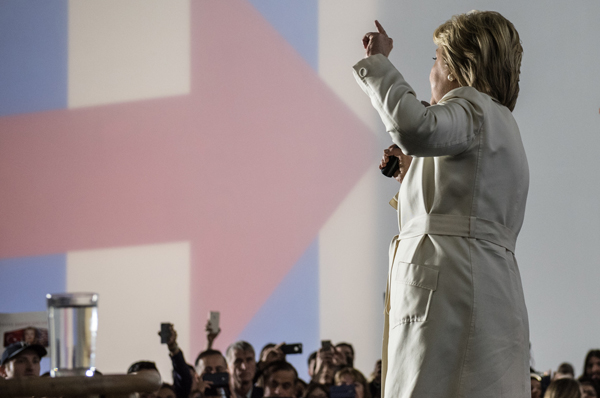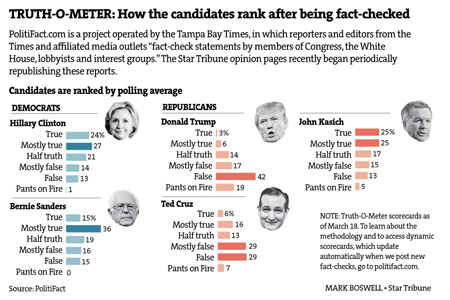Donald Trump, an inveterate liar, was the beneficiary of countless stories during the Republican primary and the general election detailing how his supporters valued his willingness to tell what they perceived as the unvarnished truth.
One focus group convened by Republican pollster Frank Luntz found people offering enthusiastic endorsements like this one: "Trump's the first person that came out and voiced exactly what everybody's been saying all along. When he talks, deep down somewhere you're going, 'Holy crap, someone is thinking the same way I am.'"
Trump, of course, was not truth-telling, but reflecting back to his supporters their own perceptions about the world, and validating their bigotry by conjuring a "reality" that does not actually exist. Crime is not going up. Terrorists are not sneaking in as refugees. Mexican immigrants are not raping citizens en masse. And so forth.
Bernie Sanders was also widely and often credited by his supporters—and some members of the political press—for his brash delivery of hard truths. Just yesterday, Bill Maher told CNN's Jake Tapper that he wants to see Sanders run for president again, "to keep everybody else honest in the race, because he just says it the way it is."
Sanders is not an inveterate liar like Trump. He does, however, in rejecting meaningful intersectional policy analysis, telegraph a particular perception of the world that excludes and precludes the perspectives and reality for a great number of marginalized people.
Still, both of these straight, white, wealthy, cis men in their 70s are widely credited with being objective observers and straight-talking commentators on How It Is.
Also yesterday, Hillary Clinton said during an interview at the Women for Women International conference that she lost, in part, because of James Comey, Wikileaks, Russian interference, and misogyny. That, by all accounts, is "telling it like it is." FiveThirtyEight's Nate Silver published a big piece today looking at the numbers and concluding that Comey "probably cost Clinton the election." Investigations into Russian interference are still ongoing, but there is no question that they interfered to derail her. Misogyny, I hear (ahem), is difficult to quantify (cough), but "research suggests she might be right."
But the political press erupted with snide resentments about how Clinton was only raising these issues to blame everyone else for her loss (she was not), rather than granting her the label, and attendant respect, of being someone who speaks the truth.
Clinton was never granted such awed deference for being consistently right in her grim warnings about Trump. She has been ridiculed for decades for publicly acknowledging the existence of a "vast, right-wing conspiracy," despite the fact that she was right, and about 15 years ahead of everyone else. And, as I have previously observed: "Right now, millions of Americans are working in jobs that will succumb to that same obsolescence, sooner rather than later. When Hillary Clinton acknowledged this reality, saying that coal mining jobs would have to be replaced with jobs in the renewable energy industry, she was attacked and obliged to apologize. For telling the truth."
That was one of many occasions during the campaign on which Clinton told a hard truth that her opponents were not willing to tell, and was castigated for it, because so many people prefer to listen to men who tell them what they want to hear than a woman who tells them the truth.
And the "fundamentally honest and trustworthy" Clinton did indeed tell us the truth.
She was rated by Politifact as the most honest of all the 2016 candidates:
In a little over a month during the primary, March through early May, Clinton received 8 Pinocchios from the Washington Post's Fact Checker, while, in the same timeframe, Sanders got nearly three times as many: 23 Pinocchios. None of Clinton's were 4-Pinocchio lies (the worst possible), while three of Sanders' were.
Clinton told the truth relentlessly throughout the campaign, even when she knew that it would not be as popular as an easy lie, or a simplification of policy so extreme that it might as well have been a lie.
Following one of her debates with Sanders, I wrote: "At her debate with Bernie Sanders in New York, she stood at her podium and held her ground, refusing to make promises she could not keep, hammering away at the details and sticking to her nuanced positions—even though she is keenly aware of narratives that voters aren't enthusiastic for her, that if she'd just relent, if she'd just match Bernie's sweeping promises and abandon her insistence on being practical, she would get more applause."
Her rigorous honesty came at a cost—and the reason that cost exists is because who we regard as "telling it like it is," and why, and who we don't.
I've no desire to relitigate the primary: These things are only relevant because Sanders is now being elevated to a position of national leadership, while Clinton is being cast aside, and because I am obliged to defend her right to speak and be visible and exist now. That the same dynamics from the primary continue to infiltrate these conversations is, suffice it to say, not my preference.
And I'm certainly not suggesting that Hillary Clinton has never gotten something wrong, mistakenly or intentionally, nor that she does not have blindspots in her perception of the world. Of course she has, and of course she does.
The point is: She's not alone in that.
But she is alone, among herself and Sanders and Trump, in failing to bear the reputation of being someone who "tells it like it is." Even though, by every estimation, she has "told it like it is" more often than either of them have.
Faced with this inconvenient fact, many people push back with some version of the old authenticity canard, mixed with some good, old-fashioned tone policing. Sure, she might be telling the truth, but the way the says it makes me not trust her. She's fake. She's too rehearsed. She's a robot. She doesn't mean it.
Which, apart from being a collection of tropes dredged from the most ancient anti-feminist sewer, is actually a concession that facts don't matter.
That what "telling it like it is" really means is: Telling me what I want to hear.
And that is not, and will never be, the same thing as telling the truth.






Shakesville is run as a safe space. First-time commenters: Please read Shakesville's Commenting Policy and Feminism 101 Section before commenting. We also do lots of in-thread moderation, so we ask that everyone read the entirety of any thread before commenting, to ensure compliance with any in-thread moderation. Thank you.
blog comments powered by Disqus